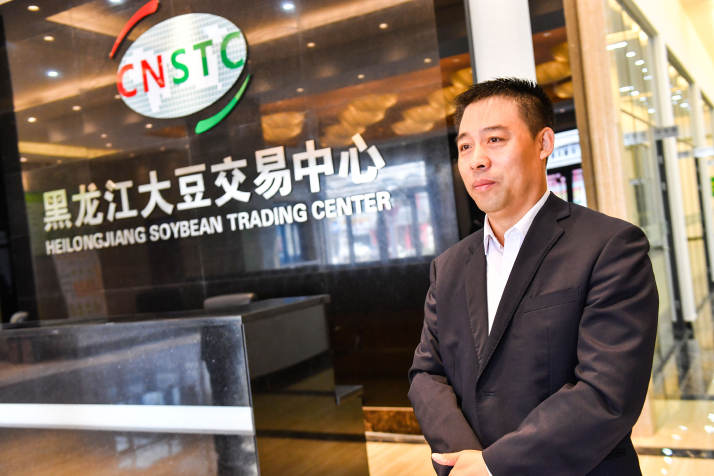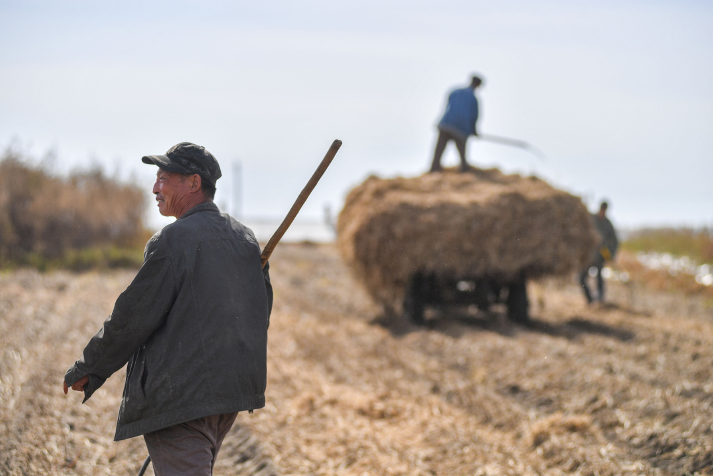Golden Green Farms
Beijing Review,November 03, 2018 Adjust font size:
Pretty and wealthy
Zhao Hongli, from Changsheng Village in Zhaodong, is an entrepreneurial pioneer. Before returning to the village and being elected secretary of the village Communist Party of China (CPC) branch in 2014, Zhao ran a liquor-brewing company for more than 20 years with more than 100 branch offices across the country.
"When I was elected village Party secretary, I was aware of the responsibility this entailed: to change the village into a new one," Zhao said. The new village needed to be clean and pretty, according to Zhao. With government grants, which largely improved its transportation conditions, street lights were erected and flowers were planted along the roads as well.
"This has greatly changed the appearance of the village," Cui Shuangxing, a resident, said. "We never had any concrete roads before; the unpaved roads were either dusty or muddy. Now it is more convenient."
Zhang Dapeng, Director of the Soybean Office of Haillun, introduces the Heilongjiang Soybean Trading Center scheduled to open in the city at the end of the year on September 28 (WEI YAO)
A compound named Happy Courtyard was built as a caring center for seniors and villagers with disabilities. A performing center for errenzhuan, a typical stage performance from northeast China, was built as both an entertainment center for the villagers and a tourist destination.
Not far from the center, a garden with various fruits and vegetables was established with a lane shrouded in grape vines down the middle. In the peak summer season, an average of more than 4,000 tourists visit the village every day. Right beside the garden, some 200 newly built greenhouses are available for rent.
"Today, many villages are populated with seniors and children," Zhao said. "I hope Changsheng will attract more young people working in cities to come back home by creating more opportunities for them."
Xiao Zhijie, a 29-year-old villager in Changsheng, was lured back by the greenhouses. Xiao used to work in Harbin, capital of Heilongjiang, as an accountant after finishing college. "I always wanted to come back to my village to do something, but I didn't see any opportunities for the young before," Xiao said. "Now things are changing."
Xiao's mother, Pan Shufan, rented 28 greenhouses to grow pumpkins this year. As an employee at a local insurance company, Pan is about to switch her work focus to the greenhouses. Xiao and her brother were very passionate about getting involved and started to learn related knowledge and market conditions via the Internet.
"To work in the greenhouses is more fun and pleasurable for me," Pan said. "To see the process from seed to fruit is a reward you can't get from doing other jobs. This year, we plan to plant pumpkin and if the market proves to be good, we will expand the scale."
"Now I can see my family every day and we work together on something we all love. It makes us happy," Xiao said.
Zheng Yan, a 33-year-old villager, rented 10 greenhouses for growing a special type of mushroom. For the past two years, he rented farmland to grow corn and soybeans, but this year, he switched to greenhouses and a new plant.
"The mushroom I grow is hard to cultivate in north China because it is vulnerable to cold weather," Zheng said. He specifically went to Dalian, a city in northeast China's Liaoning Province, to learn how to grow the plant.
"I employ villagers at harvest time and pay them 100 yuan ($14.7) per day per person," Zheng said. The mushroom grew pretty well this year, and he gets visits from villagers frequently asking questions about investment and profits. Zheng expects to earn about 200,000 yuan ($28,800) this year.
Cui Shuangxing works in the greenhouses during the harvest season and earns 3,000 yuan ($441) a month. Cui's husband works in a factory in the village and earns a similar salary. In addition, they have about 40 mu (2.7 hectares) of farmland that can bring in about 20,000 yuan ($2,940) a year.
"We are currently very satisfied with our life," Cui said. "Our income is more than enough for us."
Zhao's vision for the village, however, is more far-reaching. "To earn more is just the first step," he said. "We are planning to set up a Confucius school in the village to spread China's traditional wisdom and morality. This will be beneficial to all of us."
Currently, a motorhome park is about to go under construction and will serve as lodgings for tourists. At the end of the year, a TV drama about the village's development will be shot on location, which will be another boost for tourism in the village.
Villagers work in a soybean field in Dongxing Village, Hailun, on September 28 (WEI YAO)


cdfa6700-55c1-4239-ae3c-2327248faf90.jpg)
